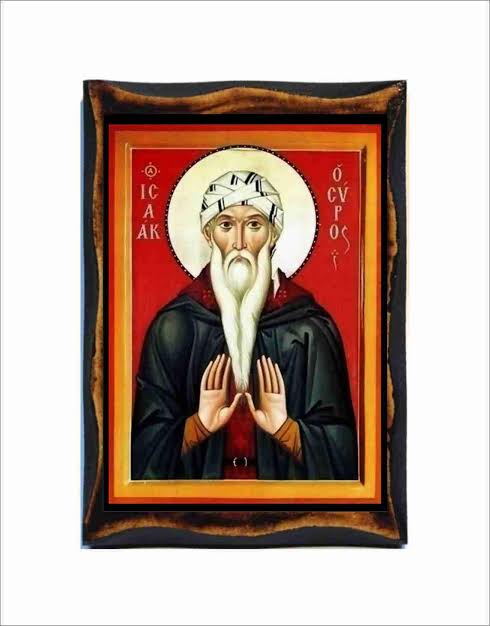Pope Francis recently put Isaac the Syrian into the Roman Martyrology, so Isaac is now officially recognized as a saint in the Latin Church.
“Pope Francis announced that he had received the consent of Mar Awa III and the Patriarch of the Chaldean Church to include St. Isaac of Nineveh in the Roman Martyrology, the Catholic Church’s official list of Saints.”
Isaac was already widely venerated throughout the East. His writings have only recently been discovered and translated in the West. The best known passage is from Homily 81:
“What is a merciful heart? It is the heart’s burning for the sake of the entire creation, for men, for birds, for animals, for demons and for every created thing; and by the recollection and sight of them the eyes of a merciful man pour forth abundant tears. From the strong and vehement mercy which grips his heart and from his great compassion, his heart is humbled and he cannot bear to hear or see any injury or slight sorrow in creation. For this reason he continually offers up tearful prayer, even for irrational beasts, for the enemies of the truth and for those who harm him, that they be protected and receive mercy. And in like manner he even prays for the family of reptiles because of the great compassion that burns in his heart without measure in the likeness of God.”
This passage was cited recently by someone in the Vatican and provoked a controversy. Isaac is a universalist. He believes the pains of Gehenna are not retributive, but healing. To believe anything else would be to blaspheme against the goodness of God.
Miguel de Unamuno in The Tragic Sense of Life also sees the centrality of universal compassion to life. Unamuno distinguishes carnal, possessive love from spiritual love.
“This other form of love, this spiritual love, is born of sorrow, is born of the death of carnal love, is born also of the feeling of compassion and protection which parents feel in the presence of a stricken child. Lovers never attain to a love of self abandonment, of true fusion of soul and not merely of body, until the heavy pestle of sorrow has bruised their hearts and crushed them in the same mortar of suffering. Sensual love joined their bodies but disjoined their souls ; it kept their souls strangers to one another ; but of this love is begotten a fruit of their flesh — a child. And perchance this child, begotten in death, falls sick and dies. Then it comes to pass that over the fruit of their carnal fusion and spiritual separation and estrangement, their bodies now separated and cold with sorrow but united by sorrow their souls, the lovers, the parents, join in an embrace of despair, and then is born, of the death of the child of their flesh, the true spiritual love.”
Such spiritual love grows from the sense of mortality, each person’s mortality, the mortality of the whole universe.
“And this compassionate feeling for other men, for your fellows, beginning with those most akin to you, those with whom you live, will expand into a universal pity for all living things, and perhaps even for things that have not life but merely existence. That distant star which shines up there in the night will some day be quenched and will turn to dust and will cease to shine and cease to exist. And so, too, it will be with the whole of the star-strewn heavens. Unhappy heavens !”
Suffering and consciousness are intimately connected
“Suffering is the path of consciousness, and by it living beings arrive at the possession of self-consciousness. For to possess consciousness of oneself, to possess personality, is to know oneself and to feel oneself distinct from other beings, and this feeling of distinction is only reached through an act of collision, through suffering more or less severe, through the sense of one’s own limits. Consciousness of oneself is simply consciousness of one’s own limitation.”
This suffering of the self opens it to the suffering of others.
“Beneath the actions of those most akin to myself, of my fellow-men, I feel — or, rather, I co-feel — a state of consciousness similar to that which lies beneath my own actions. On hearing my brother give a cry of pain, my own pain awakes and cries in the depth of my consciousness. And in the same way I feel the pain of animals, and the pain of a tree when one of its branches is being cut off, and I feel it most when my imagination is alive, for the imagination is the faculty of intuition, of inward vision.”
As Paul said, the whole cosmos groans, it is subjected to futility and mortality, not because of its own fault, but that it may someday participate in the glorious liberty of the sons of God.
“18 I consider that the sufferings of this present time are not worth comparing with the glory that is to be revealed to us. 19 For the creation waits with eager longing for the revealing of the sons of God; 20 for the creation was subjected to futility, not of its own will but by the will of him who subjected it in hope; 21 because the creation itself will be set free from its bondage to decay and obtain the glorious liberty of the children of God. 22 We know that the whole creation has been groaning in travail together until now; 23 and not only the creation, but we ourselves, who have the first fruits of the Spirit, groan inwardly as we wait for adoption as sons, the redemption of our bodies. 24 “
Unamuno had no knowledge of Isaac, but their thoughts on contemplating the sorrows of creation were similar.
